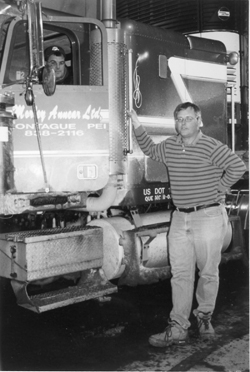
Features
Production
Research
P.E.I. trucking firm shipping spuds year-round
shipping spuds year-round
April 22, 2008 By Kathy Birt
Shipping potatoes to Toronto and
Boston makes up 50 per cent of the business for P.E.I. trucking company
Morley Annear Ltd. of Montague, P.E.I.
 |
| Scott Annear is in constant contact with his drivers when they are off-Island. Here he checks with driver Shawn Mallard before Mallard leaves the Island with a load of P.E.I. potatoes. (Photo by Kathy Birt) |
Shipping potatoes to Toronto and Boston makes up 50 per cent of the business for P.E.I. trucking company Morley Annear Ltd. of Montague, P.E.I.
But the 18 tractor trailer trucks and 24 employees didn’t happen overnight for Island businessman Morley Annear, whose ancestors came out from England in 1840 to take up farming in Lower Montague.
The farm property of his ancestor is still a part of the family fabric where he makes his home today. It was 1962 when Annear returned to the family farm from two years of study at the Nova Scotia Agri-culture College. He married his wife, Jean, in 1964, and the following year the couple planted 17 acres of potatoes. That season they lost $2,200.
“At that time, you had to get bigger, or get out,” says Annear, who now operates his fleet of trucks with his two sons, Scott, 39, and Brian, 34.
Scott, obviously proud of his heritage, says that remains of the farmstead’s old barn can still be seen on the family property where, in its heyday, farming reined. “Back 50 years ago, our road had 150 working farms on it. Now there are only two.”
On this farm, Morley grew cole crops and raised pigs and beef cattle as he and Jean built up their trucking business, which was started by trucking gravel on the side. “We ran the trucking business out of the house until 1990, when we moved to this location in Montague. We outgrew our operation at home. This is a better location and better facility”
Scott points out that in the 1960s, a lot of P.E.I. farmers were operating mixed farms with no more than 30 to 40 acres. “It was in the 1970s when the acreage began to increase,” he says, and adds, “It got to a point where equipment costs were high and farmers had to make the decision to grow more acreage or it wasn’t worthwhile.”
Despite their father’s humble beginnings and losses in potatoes back in 1964, Scott and Brian had a “notion” to grow potatoes in 1991 and Scott says, “We made a little money the first year and kept on going.”
The two brothers now grow 500 acres in a three-year rotation, most of which is contracted for the processing market.
“Most of our potatoes go to Cavendish Farms,” says Scott. He says they grow a small amount of table stock but presently are not working on moving them.
Located on the main street in Montague, the trucking firm never generated much potato business outside the Atlantic Provinces until 1980. “It’s only in the past three to four years we have acquired solid markets in Boston and Toronto,” Scott says.
Comfortable in his role as both a potato grower and office manager, the younger partner mans the phones and coordinates the trucking company’s operations while Brian oversees the farm.
Scott points out that the trucks are outfitted to carry varied types of loads, such as blueberries, fish, and fertilizers, plus bulk potato transportation. “It’s a big, big niche market that was an important one to break into. The conveyor floors allow the farmers to load directly from the conveyor in the warehouse.” All of this is cost effective when moving spuds from the Island to the U.S.
These “live floor” trailers are bought from Trout River Industry located in O’Leary, P.E.I., and owned by Matthew Brown and Harley Stewart. Producing their first unit in 2000, they have exported potato-handling equipment as far as Russia with their main markets in the Atlantic region as well as Quebec and Ontario.
Producing 40 units of various configurations annually, Brown says he and Stewart have considerable experience in agriculture and the potato business. “We are farm boys from way back.”
He points out their trailers can be loaded and unloaded indoors, which is critical to transporting potatoes and other vegetable crops in the sub-zero temperatures experienced throughout the past several winters in the Atlantic region.
Maintaining 17 employees at Trout River industry, Stewart and Brown build trailers with cost effectiveness in mind. He points out that all products and/or produce can be loaded into the trailers with no elevation required.
“The trailers are completely versatile. They can haul a variety of materials, including lime, which is closely related to the potato business.”
Thus, he points out that a trailer can haul a load of potatoes to northern New Brunswick and come back with a full load of gravel.
This feature makes them ideal for Morley Annear,Ltd. And although the Annear’s trailers primarily haul potatoes today, they can still work hauling other product.
Proud to say he employs all local people in his trucking firm, Morley points out that spring and fall are the peak times to transport product. For this Island company, the name of the game is keeping Island potatoes moving and always travelling with a loaded trailer.
“In the past year, we’ve been lucky. We’ve never stopped moving potatoes. In fact, there was one week, we moved a load of old the same day we moved a load of new (potatoes),” says Scott.
“We try to keep everybody happy,” said Morley. “If we say we are going to be somewhere at a certain time, then we are there.”
Print this page